Is marketing on Facebook still worth the effort?
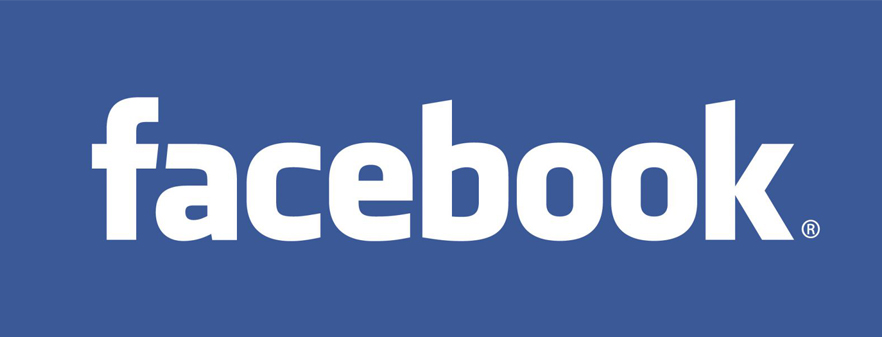
Facebook has been rolling out some interesting initiatives over the last few months, including the expansion of social context outside sponsored stories, its first step into becoming a mobile ad network, and new targeting options added to custom audiences. Yet, some people are questioning the viability of the platform, both in organic content distribution, as well as an advertising platform. We decided to go over some of the latest studies assessing Facebook’s performance on a few key metrics, as well as an experiment conducted to uncover the “click farm” market, in order to determine if Facebook is still worth the effort for brands and marketers, despite the recent criticism.
-
Facebook performance, effectiveness & satisfaction
Facebook referral to websites
Shareaholic conducted a study on Facebook referrals during a 13 month period, including over 200,000 publishers with a reach of 250+ million unique monthly visitors. The objective was to identify the progression of Facebook as a referral source and to uncover the impact of the launch of new/redesigned features such as the new Like and Share buttons rolled out on November 6th. The following chart represents Facebook’s share of overall visits across Shareaholic publishers’ network, from November 2012 to November 2013:

As highlighted by Shareaholic, two main insights are identifiable:
- Facebook’s share of visits increased by 169.88% over the last year
- Facebook’s share of visits increased by 47.44% from October to November 2013The chart above has been turned into a graph for an easier read:
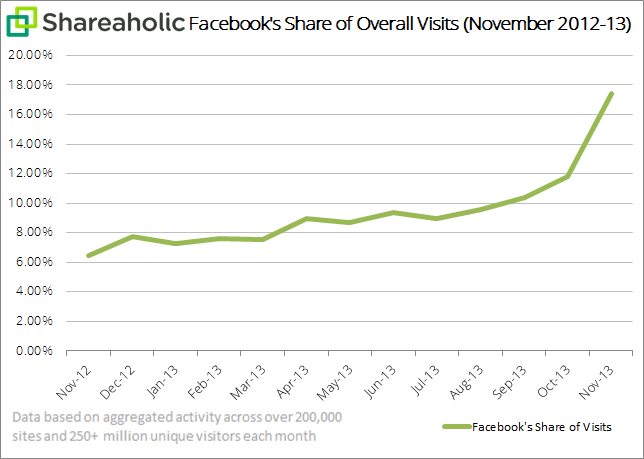
Facebook referral to ecommerce
Experian conducted a study on the top social referrer for the last holiday season in order to identify which social channel is the most effective in driving traffic to retailer websites, as reported by Marketing Land. The results of the study have been summarized in the table below:
Facebook was the top social referrer during the last holiday season, accounting for over 5.32% of the social referral to retailer websites, up by 38% from last year.
Facebook ads performance compared to Twitter
Facebook appears to be quite effective in driving visits to websites and ecommerce, but how does its advertising platform compare to its competition? This is the question that the folks at Wordstream have tried to answer by conducting an extensive study comparing the performance of Twitter and Facebook as ad networks, which we encourage you to take a look at.
The findings are insightful, and give credit to both platforms on different metrics:
Facebook offers a:
- 275% higher click-through rate (CTR)
- 216% higher revenue-per-click (RPC)
- 40% lower cost-per-click (CPC)
Twitter however tends to be more attractive when it comes to the following metrics:
- 22% higher brand conversation
- 30% higher positive mentions
- 32% higher share rate (through retweets)The findings above have been detailed in the following chart:
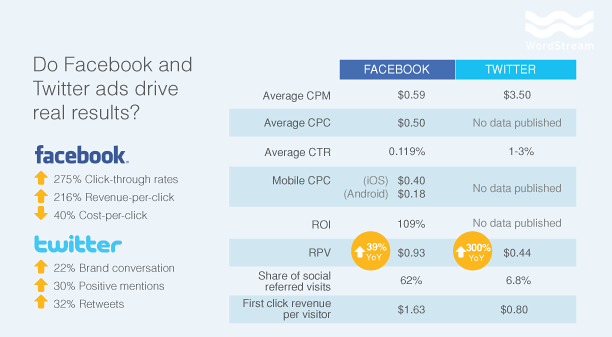
These data won’t allow us to properly assess the effectiveness of Facebook ads, but we can at least already determine that they are more effective than Twitter ads in generating clicks and revenue, whereas Twitter ads create more engagement.
If you want to get more detailed metrics, especially broken down by industry, we encourage you to take a look at the Facebook Ads Performance Guide put together by Exact Target: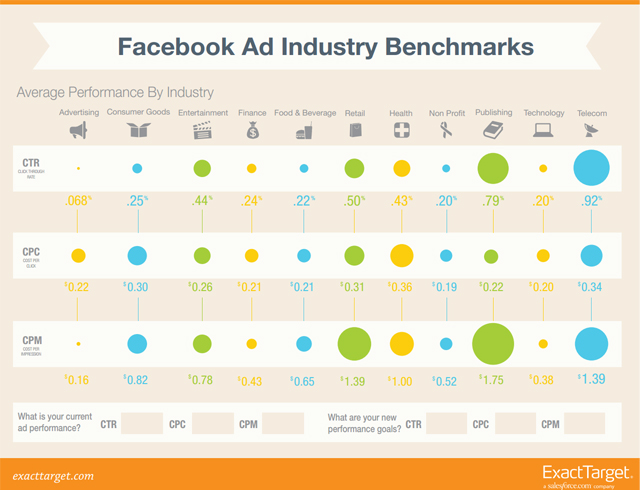
What do marketers think of Facebook?
We have seen above that Facebook seems quite effective in driving traffic to websites and is viable when it comes to competing social ad platforms such as Twitter, so it could come as a surprise that Facebook has been ranked last on a satisfaction index of digital marketing channels in a survey conducted by Forrester among 395 marketers in US, UK and Canada.
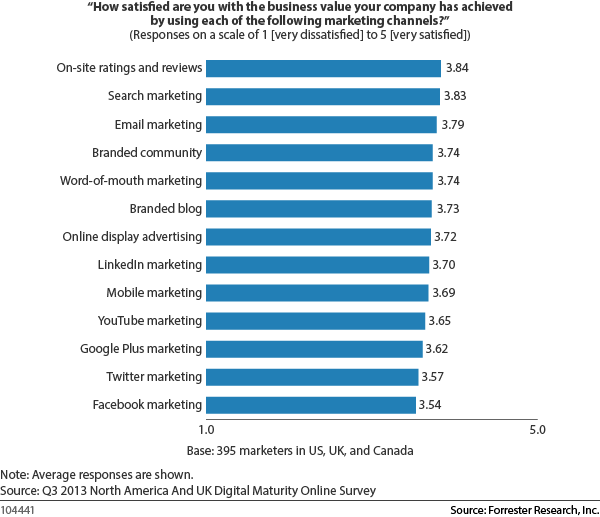
The Forrester analyst who wrote the open letter to Mark Zuckerberg mentioned the following reasons for the lack of satisfaction towards Facebook:“First, your company focuses too little on the thing marketers want most: driving genuine engagement between companies and their customers. Your sales materials tease marketers with the promise that you’ll help them create such connections. But in reality, you rarely do. Everyone who clicks the like button on a brand’s Facebook page volunteers to receive that brand’s messages — but on average, you only show each brand’s posts to 16% of its fans. And while your company upgrades its advertising tools and offerings monthly or more, you’ve done little in the past 18 months to improve your unloved branded page format or the tools that marketers use to manage and measure those pages.
Second, your company isn’t good enough at the pure advertising business onto which you’ve shifted your focus. We estimate your site now delivers tens of billions of display ads every day. But fewer than 15% of those ads leverage your ever-growing cache of social data to target relevant audiences. And your site’s static-image ad units offer marketers less impact per impression than they could achieve with the ad units other sites offer. The result? The executives we surveyed said Facebook’s display ads were significantly less effective than the display ads they buy elsewhere online. They also reported that Facebook ads were less valuable than any other marketing tactic they could use on your site.”
What is even more concerning is that the mentioned average reach of 16% for brand posts is said to have drastically decreased over the last few months due to updates to the news feed algorithm. -
Facebook Organic reach
Last December Komfo released the results of a study conducted from August to November 2013 on fan penetration on Facebook. The objective stated was the following: "We recently conducted a comprehensive analysis of the effect of Facebook’s recent changes in their newsfeed algorithms, which underlines that the challenge of getting commercial content into fans’ newsfeeds has become greater than ever.”
Some results were positives, such as:
- 31% increase in viral amplification
- 28% increase in click-through rate (CTR)Other metrics were more concerning, especially the 42% decrease in fan penetration (the percentage of your fan base that you reach with each post) from August to November. Worst of all, Facebook has since rolled out another update to its News Feed algorithm, as mentioned in this post on its Facebook for Business page:
“People are connecting and sharing more than ever. On a given day, when someone visits News Feed, there are an average of 1,500 possible stories we can show.
As a result, competition for each News Feed story is increasing. Because the content in News Feed is always changing, and we’re seeing more people sharing more content, Pages will likely see changes in distribution. For many Pages, this includes a decline in organic reach. We expect this trend to continue as the competition for each story remains strong and we focus on quality.
As the dynamic nature of News Feed continues to follow people’s patterns of sharing, Page owners should continue using the most effective strategy to reach the right people: a combination of engaging Page posts and advertising to promote your message more broadly.”Insight Social Media has analyzed the effects of this News Feed algorithm update during the week following December 1st, and the results are quite surprising: on average, the organic reach of the pages analyzed has decreased by 44%, and as much as 88% of certain pages, as seen on the chart below:
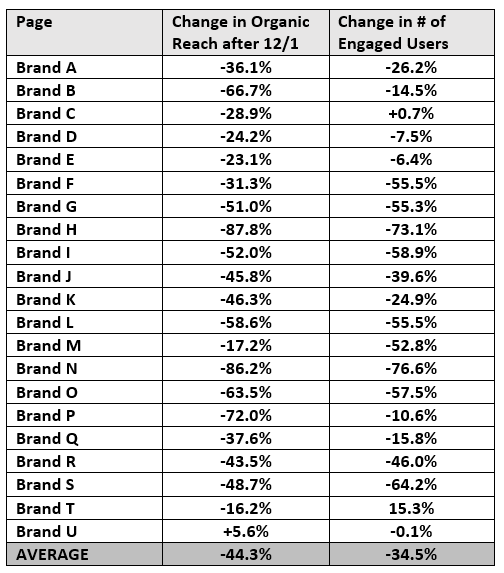
Insight Social Media also advocates that the average organic reach is nowhere near 16% anymore, but closer to 2.5% for a standard post.
This continuous decrease in organic reach is really forcing brands and marketer to use ads on Facebook to promote their content if they hope to reach a significant portion of their audience. Recent experiments have however uncovered that Facebook ads could be less effective than expected; in fact they could actually negatively affect your organic reach in an unrecoverable way. -
Facebook advertising platform & the problem of fake likes
There has been a lot of buzz lately around an experiment conducted by Filmmaker Derek Muller who has created a video exposing the click farm market developed in emerging countries such as the Philippines or India.
These click farms are selling fake likes to companies wanting to increase their follower count on Facebook. The assumption could be made that only the company paying for those fake likes will see their engagement drop as fake likes never interact with your content, which ultimately dilutes your organic reach as Facebook “tests” a post’s engagement on a few followers to determine if the content is worth being served to more followers. However, it would be quite simple for Facebook to identify thousands of likes coming from emerging countries known for their click farms, so the farms actually click every “Like” button they see, which makes the activity much more difficult to identify. As a result, advertisers on Facebook end up gathering fake likes without ever having paid a click farm, and see their organic reach decrease continuously due to an almost non-existing engagement from those fake likes.
Muller first identified the click farm problem when advertising his Veritasium Facebook page in 2012 as he received over 80,000 fake page likes. In order to identify these fake likes, Muller created a chart representing the average engagement by country. The results are more than explicit, with countries known for their click farms accounting for the majority of likes, and averaging at less than 1% of engagement:
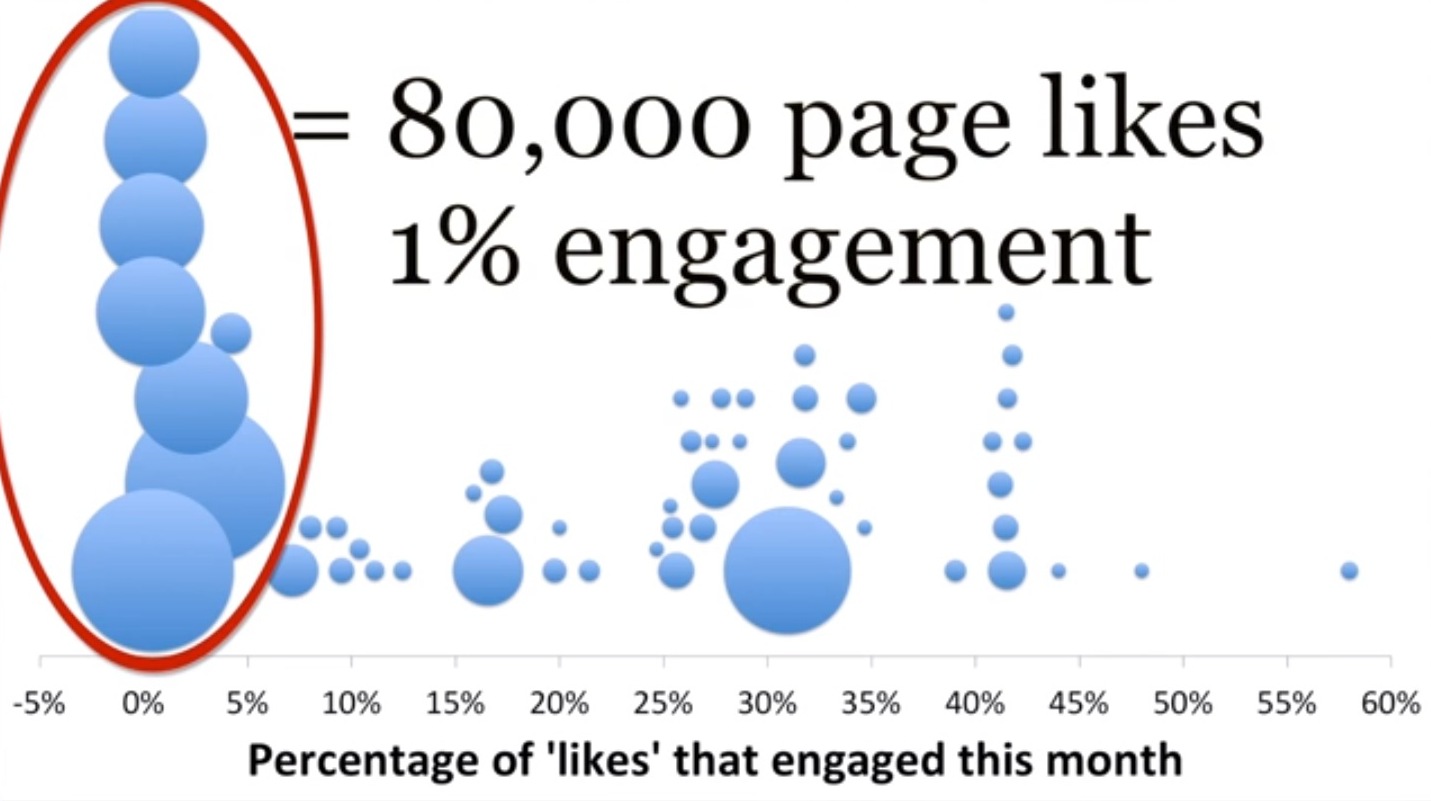
We encourage you to have a look at the following video created by Derek Muller which summarizes his 2 experiments and the findings uncovered:
-
What can Facebook do about it?
This is a difficult situation for Facebook, the company has two options. The first one would be to acknowledge the problem with click farms, but that would basically mean that Facebook admits that there is an issue, that they are aware of it, benefited from it indirectly as it forces brands to advertise even more to maintain their previous engagement rate, but did not address the problem earlier. The second option would be to simply deny the problem, which could drastically affect advertisers’ trust in the ad platform.
A Facebook spokesperson has since made the following statement, as reported by the Washington Post:“Fake likes don’t help us. For the last two years, we have focused on proving that our ads drive business results and we have even updated our ads to focus more on driving business objectives. Those kinds of real-world results would not be possible with fake likes. In addition, we are continually improving the systems we have to monitor and remove fake likes from the system.
Just to be clear, he created a low quality Page about something a lot of people like – cats. He spent $10 and got 150 people who liked cats to like the Page. They may also like a lot of other Pages which does not mean that they are not real people – lots of real people like lots of things.”Some of the items of this statement are however quite questionable, as Derek Muller explains on his Facebook Page:
“FB: I'd like to be clear that he intentionally created a low quality Page about something a lot of people like – cats.
Me: Correct - the goal here was to see if people would blindly like anything, including a page that clearly calls them an idiot if they like it. And they did. The implication is they never even looked at the page, and this is backed up by statistics on the page. To me this is not genuine behavior. I don't know anyone who would like a page without either knowing the brand or checking out the page first.
FB: He spent $10 and got 150 people who liked cats to like the Page.
Me: Why can't they get the facts right? I spent $10 and got 39 likes (much faster than I expected and from only the US, Canada, Australia and the UK). Then I spent a further $15 and ended up with a total of 262 likes.
FB: They may also like a lot of other Pages which does not mean that they are not real people – lots of real people like lots of things.
Me: OK, here's the thing. The global average likes per person is 40. For most countries it looks like 20 and below. Virtually everyone who liked my page liked in excess of 900 things (I say virtually because I could only spot-check random profiles and then the number of likes is not easy to ascertain - you have to scroll for miles through their likes and then count using a query of the code). These are clearly not typical accounts. Now the claim this "does not mean that they are not real people" might be valid. They may well be accounts made or controlled by an actual human (could be an employee at a clickfarm, could be someone who is paid to like pages, eg. Paid-to-like dot com). However I think their likes are not genuine. So this is a distinction I imagine FB would not be keen to make. There may be 'fake' likes coming from 'real' profiles. Then they might throw up their hands and say 'even if what he's saying is true, how could we ever deal with this kind of activity?' I would say if there is a page like that never results in engagement with the page, it is a bogus like and the like should be deleted, not necessarily the account, but certainly the like.
FB: Also, his example for his own page from May 2012 is almost two years old, and as indicated above, we have significantly improved these systems over the past two years."
Me: This is perhaps most worrying of all. In essence: in the old days, sure fake likes could happen, but not now. What troubles me most about this admission is they have done nothing to correct the problem. If they're aware those 80,000 likes are dead weight they should have eliminated them. And they have since benefited from those 80,000 likes when I paid to try to reach them. I hadn't dug into my demo data so I didn't know how bad the problem was and I paid to boost posts out to these useless likes. That is a problem!
Reporter: Some of the people who were passing around your video this week cited as a reason to be skeptical of Facebook's market valuation. Of course, it is very difficult to know just how big a problem clickfraud is. Do you have any evidence that gaining likes actually helps you?
Me: I was thinking about this a bit last night. In the past I have run Google Adwords campaigns and I never saw much suspicious click activity. But people have rightly made the point that some clicks in any campaign are bound not to be genuine.
But here is the big problem with fake likes on Facebook. Unlike a fraudulent click on Google these fake stay with you forever (even two years later when Facebook's Fraud detection has moved on). They weigh on your engagement and edge rank because the accounts never intended to engage with you. And then you end up paying again to boost the post out to them - and they were never real in the first place!”Addressing the issue of click farms is definitely going to be a challenge for Facebook, however, giving the ability to a page manager to control and delete likes could the first step towards eliminating these fake likes affecting your organic reach. As Muller suggests, automatically disabling a like if there hasn’t been any engagement over a certain period of time could also be an option, although it could affect real users.
-
Is marketing on Facebook still worth the effort?
Independently from the click farm problem, the average organic reach on Facebook has drastically decreased over the last few months, supposedly from 16% to an average of 2.5%. We also know that advertising on Facebook can further reduce this already low organic reach. So is Facebook still worth the effort?
If you have already advertised on Facebook without very specific targeting options, chances are you have already been affected by fake likes. Targeting specifically the US and Canada for example does not prevent you from getting fake likes as seen in Muller’s video. Unfortunately, as of today there is no way to get rid of the existing fake likes, nor to prevent future ones, so the only way to aim for a high reach is to “boost” your content, which can end up being quite costly.
If you haven’t yet advertised on Facebook, you might be in better position. The safest thing to do would be to stay away from ad products, and to simply “boost” your content. You won’t be able to get many new likes, but you will reach as many of the existing ones as possible.
If you haven’t yet advertised on Facebook but wish to do so, there are ways to prevent getting too many fake likes, if not any at all (get in touch with us if you would like to discuss how these techniques can be applied to your business):
- Custom audiences: Facebook provides the following definition “Custom Audiences let advertisers find their existing audiences among people who are on Facebook”. By specifically targeting users based on their email addresses, phone numbers, Facebook user IDs, App user IDs, IDFAs or by remarketing previous visitors of your website or users of your app, you ensure to only reach real people.
- Partner categories: US advertisers have the option to use third-party data gathered by Acxiom, Datalogix and Epsilon to target users based on their past purchases.
Marketers and page administrators have been continuously expressing their frustration regarding the ever decreasing organic reach over the last few months. Furthermore, it appears that the solution advocated by Facebook to advertise to overcome the poor organic reach isn’t beneficial, and likely counter-effective.
Facebook is now in a position where it has to offer guarantees for the value of its ad products, and needs to either effectively solve the click farm problems, or empower page managers to clean their fan base themselves if the company wants to maintain a viable image among brands and marketers.
.PNG)


